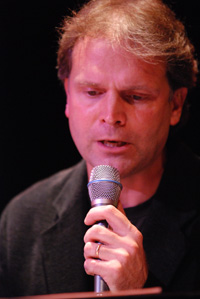Don't see what you're looking for?
Main Site
Berklee.eduCampuses and Schools

Paul Stiller
For media inquiries, please contact Media Relations
Paul Stiller is a professor in the Ear Training Department at Berklee College of Music. A graduate of Berklee and the University of Wisconsin–Eau Claire, he has been a member of the faculty since 1995. He has taught Ear Training 1–4, Rhythmic Ear Training, Performance Ear Training for Voice, voice lessons, and a choral ensemble.
Aside from teaching, Stiller has been an active adjudicator and clinician with numerous college and high school groups throughout the United States and Japan. He is a founding member, producer, arranger, and vocal percussionist for the a cappella quintet Vox One, Composed solely of Berklee faculty. He has opened for Stevie Ray Vaughan, Atlanta Rhythm Section, Dwight Yoakam, Ray Charles, Chicago, and the Woody Herman and Count Basie orchestras. He has worked on commercials for companies such as Sears, TCBY, State Farm Insurance, Hood, Pontiac, GMC, Superior Coffee, International Trucks, Sharp, and Dr Pepper. In 2012, Paul received the Distinguished Faculty Award from Berklee.
- Founding member and arranger/producer for Vox One
- Additional performances with Club d’Elf and Rhythm Slam
- Recordings with Vox One, Club d’Elf, and Ahmad Jamal
- Commercial work (as arranger/performer) includes Sears, TCBY, State Farm Insurance, Hood, Pontiac, GMC, Superior Coffee, International Trucks, and Dr Pepper
- Adjudicator and clinician throughout the United States and Japan
- Distinguished Faculty Award, Berklee College of Music, 2012
- Diploma, Berklee College of Music
- B.S., University of Wisconsin–Eau Claire
"When I was a little kid growing up in the '70s, I'd wait for a certain song to come on the radio and run to the piano to see if I could figure it out. We didn't have records of those songs, so it was only when the song would come on the radio that I could try to go after it again. It was kind of a funny, unusual process; my parents really had no idea what I was doing. They still don't, I think!"
"Teaching ear training is automatically easy for me, because I grew up as a 'by ear' player. I play piano and do vocal percussion, which is part of what I've done in Vox One. I produce records, too, and having really good listening skills as a producer is absolutely paramount. In fact, producing embodies every single thing I teach in ear training: professionalism, ears, and problem-solving."
"When you're producing an album and run into performance problems, you have to troubleshoot on the spot. Ear training gives you tools to draw from. But you also need communication skills to work with different musicians in a way that makes sense to them. I've worked with groups of people who are unbelievably talented but can't read music and have never tried to lock to a click track before. So you have to come up with a new musical language to reach them. It's all about figuring out new ways to teach the same thing."
"When I'm teaching, I have to go at a topic from every angle I can think of, because not everyone gets what I'm talking about in the same way. Pretty much on a daily basis, somebody says something in class that makes me think about how to teach something in a new way."
"I'm very interactive with my students; I know all their names and they know mine. That's important to me, because the more I know them, and the more I get to hear them and comment on how they're doing, the better the relationship is and the easier it is to get them comfortable with talking to me. That's probably the hardest part of teaching."
